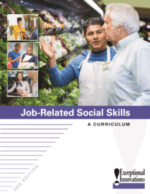
Want your students to be accepted by their supervisor, co-workers, and customers? Increase the probability by directly teaching them how to use good workplace manners and avoid behaviors that are perceived as annoying.
September has been targeted as a month for remembering to use manners—whether in school, the community, at home, or in the workplace. But why limit the focus on manners to only September?
In a USA Today article (p. 5B, 9-8-18), “Why You Gotta Be So Rude? Spot These Co-Workers,” small business expert Steve Strauss writes “rudeness is running rampant in the workplace these days—and it’s not just the usual culprits of food stealers and loud talkers.”
When teaching a job-related social skills lesson on manners in the workplace, expand the conversation to co-worker behaviors that are annoying or just plain rude. Use this conversation as an opportunity to reflect on behaviors that are knowingly or unknowingly undermining job success.
Conversation Starters: Teaching Manners in the Workplace
Invite students to describe behaviors that they find rude or annoying in the workplace. List those behaviors. Ask students to describe why the behaviors have a negative effect on co-workers. Consider these examples:
A person who interrupts conversations. When an individual does this a lot, ask students to think about how the people being interrupted might respond (e.g., roll their eyes, look away, or grimace). If the interruptions include bragging or “one-upping,” the behavior might be perceived as not just annoying but also demeaning to the people interrupted. Waiting one’s turn to speak is an appropriate social skill that can be taught and practiced. Knowing when it is appropriate to interrupt—and how to phrase the interruption (e.g., “Excuse me, I’m sorry to interrupt, but there is an emergency …”)—is another job-related social skill that can be examined in this context.
A person who leaves messes for others to clean up. When an individual routinely leaves things for others to clean up (e.g., dirty coffee cups on the counter, paper towels in the sink, used napkins on the floor, soda cans in the meeting room), co-workers may perceive it as an attack on their worthiness; after all, why does the person think he or she deserves maid service? Students can be taught a job-related social skills routine to check the work or break area before leaving it to make sure they have not left anything.
A person who constantly looks at his or her phone during conversations. For some people, this may be considered “normal” behavior. But to others, it is considered rude. They may think, “What is happening on the phone that is more important than me or what I have to say?” It also may signal to a supervisor that the worker puts a low priority on the job and cannot be considered a trusted employee in line for raises, promotions, and rewarding opportunities. Having good listening manners is a job-related social skill that can be taught and practiced.
A person who has poor hygiene. Surprisingly, some individuals have not considered the effect that certain personal habits can have on co-workers, especially when working in close proximity with each other. Habits that others may find annoying include not bathing, bad breath, wearing too much perfume or aftershave; nail biting, picking one’s head, and loudly clearing one’s throat. Discuss how good manners include attention to how personal habits affect coworkers’ perceptions—either positively or negatively.
A person who is always late. There can be good reasons for being late (e.g., traffic jams, a malfunctioning alarm clock, an emergency), but a person who constantly is late—not just to work but to meetings, back from break, at the start of shifts—can be perceived as expecting others to pick up his or her slack for no good reason. Being prepared and on time is a job-related social skill that can be taught. Part of this skill includes letting people know if you are going to be late (e.g., a phone call, email, or text).
Using a role-play format, ask students to enact how identified behaviors create tension in the workplace. Afterward, create an opportunity for students to self-reflect on their behaviors that may be considered annoying. Have them pick one and develop a personal plan for eliminating it.
Learn More About Teaching Job-Related Social Skills
 Job-Related Social Skills: A Curriculum (3rd edition) is designed to develop basic, foundational job-related social skills required across most employment areas. Instructors can use Job-Related Social Skills: A Curriculum to provide participants with these basics so that they have a leg up in getting and keeping a job. Learn more.
Job-Related Social Skills: A Curriculum (3rd edition) is designed to develop basic, foundational job-related social skills required across most employment areas. Instructors can use Job-Related Social Skills: A Curriculum to provide participants with these basics so that they have a leg up in getting and keeping a job. Learn more.
